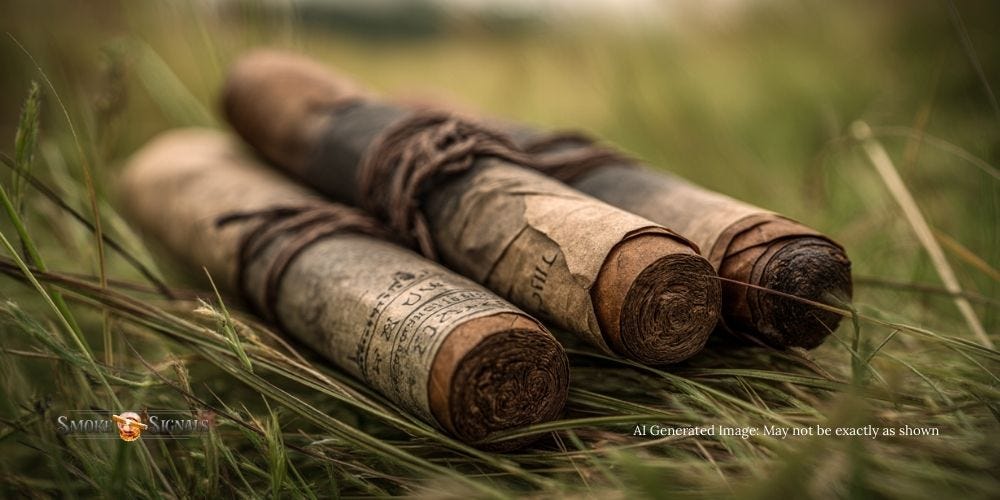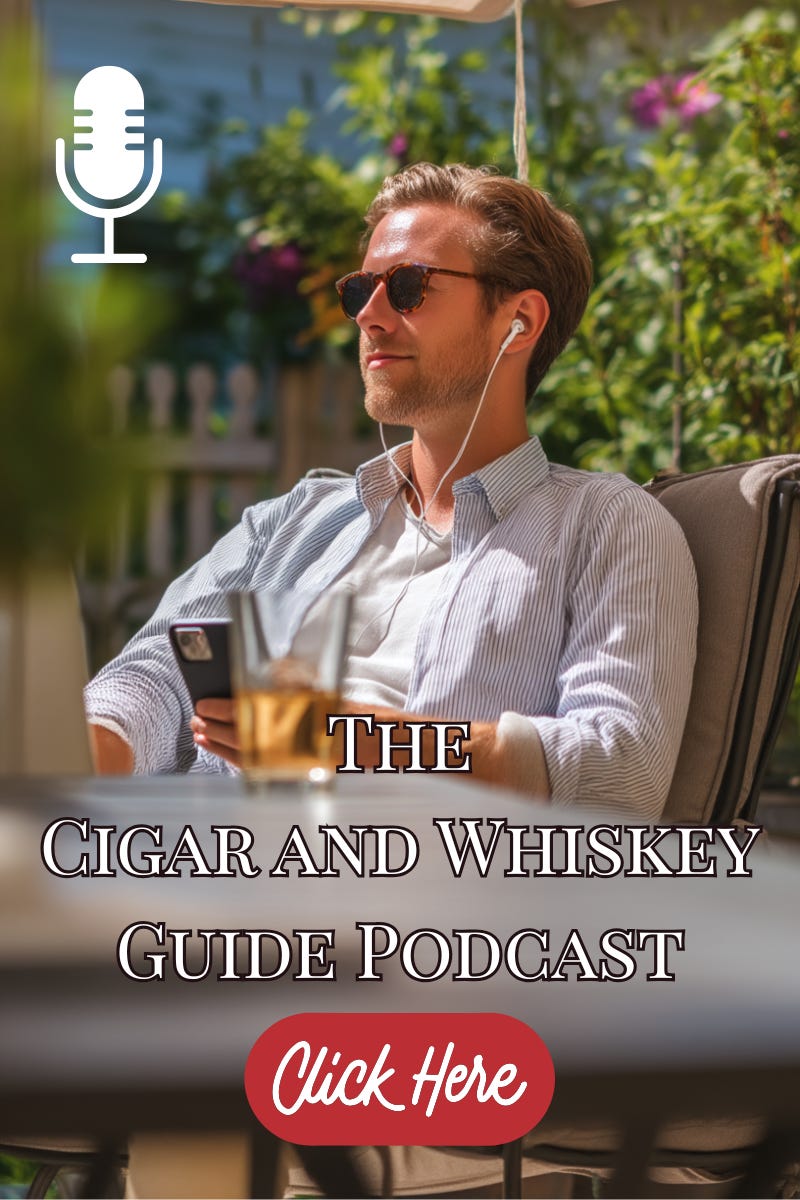Smoke and Survival in the Civil War
From campfire rituals to a lost order wrapped around cigars, discover how tobacco shaped the war’s most human moments.
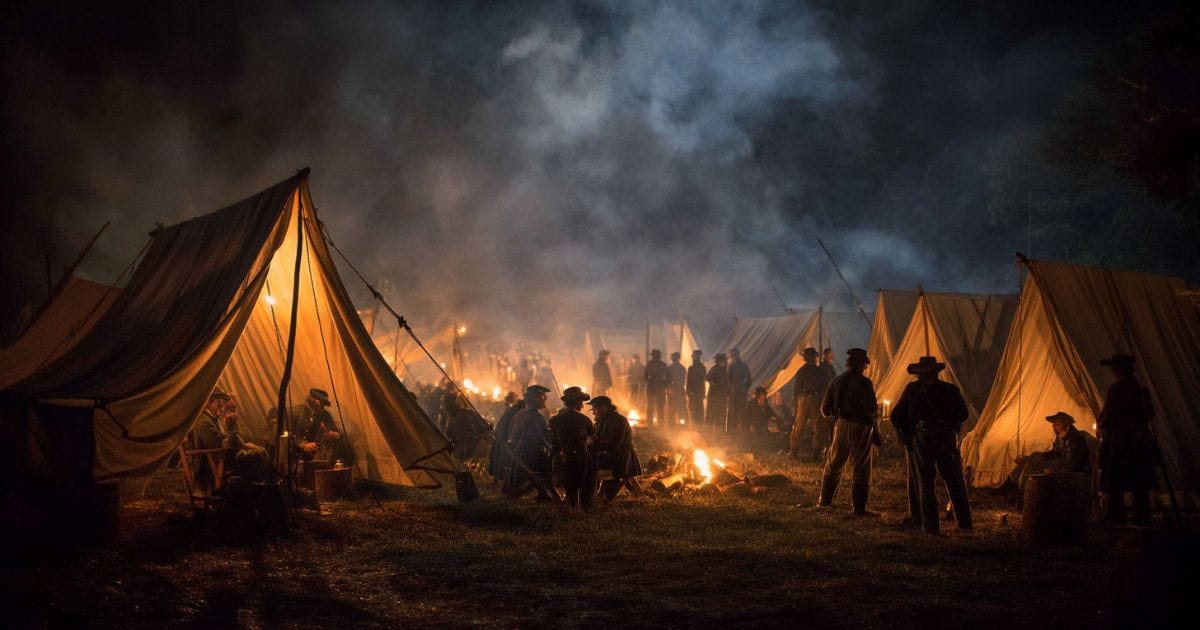
Listen While You Read 🎧
Hit play and let the companion podcast carry you into the smoky camps of the Civil War while you enjoy the story below.
Introduction
The year is 1862. The guns have quieted for the night, and campfires crackle across muddy fields. Weary men in blue and grey lean back on their packs, boots caked with dust, rifles stacked within reach. In their hands, not a musket or bayonet, but a simple cigar — its glowing ember casting a faint red halo against the dark. In a war defined by blood and division, cigars became more than leaf and paper. They were a ritual, a comfort, and sometimes even a bridge across enemy lines. This is the story of how smoke rose over the camps of the Civil War.
Key Takeaways 🔑
Cigars served as rare luxuries in both Union and Confederate camps, offering soldiers a taste of home.
Tobacco became a form of currency and a symbol of camaraderie, traded even between opposing sides.
One forgotten bundle of cigars — wrapped around General Lee’s orders at Antietam — shifted the tide of the war.
Lighting a cigar became a ritual of survival and reflection, echoing traditions we still honour today.
Smoke in the Camps
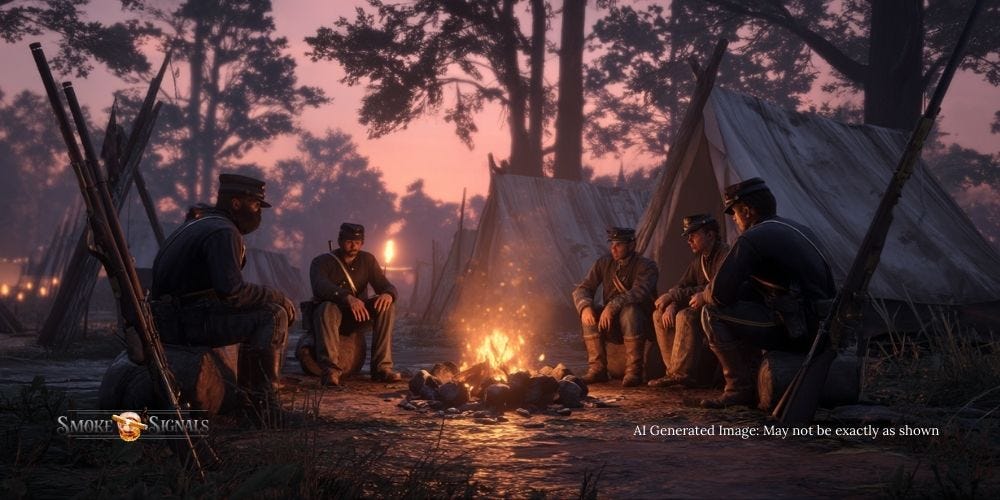
Picture the Union encampment at dusk: tents sagging from rain, soldiers sprawled on the ground with uniforms stiff from mud and sweat. The air carries the sharp scent of boiled coffee mixed with woodsmoke and gunpowder. And then, cutting through it all, the sweet, earthy aroma of tobacco. A few men pass around a single cigar, each taking a careful draw before handing it on, as though savouring a secret treasure.
For these soldiers, a cigar was more than leaf and fire. It was a stolen moment of normalcy, a reminder of porches back home, of fathers and uncles leaning against fence posts, telling stories as the smoke curled skyward. In Confederate camps, where tobacco fields lay just miles away, the luxury was a bit more common — though still cherished. Union soldiers, by contrast, often relied on supply trains or luck, and sometimes the smoke came from coarse substitutes rolled hastily in camp.
But whether finely wrapped Havana or a rough twist of Virginia leaf, the act was the same: to draw in the smoke, hold it for a moment, and exhale into the night. Around those campfires, cigars softened the edges of war. Laughter returned, songs were sung, and the long march ahead seemed, for just a little while, less unbearable.
Currency Across Enemy Lines
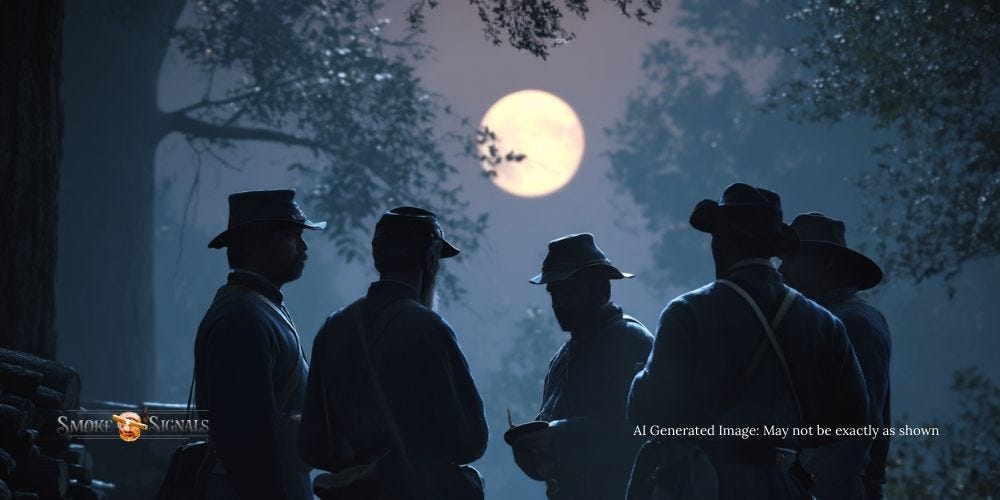
On quiet nights, when the crack of rifles faded and both sides hunkered down in their lines, the battlefield sometimes turned into a marketplace. Union soldiers, rich in coffee but poor in tobacco, would call across the no-man’s land. From the shadows came answers in Southern drawls, men of the Confederacy willing to swap leaf for beans. Soon, under the thin glow of the moon, blue and grey pickets would meet halfway, trading goods — and occasionally, stories.
A cigar could buy you more than a few moments of calm. It might purchase a handful of salt pork, a packet of needles and thread, or even a swallow of whiskey. In a war where supply lines often faltered, tobacco became currency as real as coin.
There are stories of soldiers sharing more than trade. One Union private recalled tossing his last cigar to a weary Confederate across the lines, who lifted his cap in thanks before fading back into the dark. For a moment, enemies were simply men, united by the ritual of smoke curling into the night.
The war would rage on at sunrise, but in the hush between battles, cigars acted as a fragile bridge — proof that even in the fiercest of conflicts, humanity sometimes found a way to glow, ember-like, in the dark.
The Cigar that Changed History
It was September 1862, and General Robert E. Lee had marched his Confederate army deep into Maryland. Tucked into his pocket was Special Order 191, a document spelling out the exact movements of his divided forces. Somehow, somewhere, the order slipped away. When it was found, it wasn’t clutched in a soldier’s hand or locked in a chest — it was wrapped around three cigars, left forgotten in a field near Frederick, Maryland.
A pair of Union soldiers stumbled across the bundle. At first glance, it seemed like a lucky find: a few precious cigars to break the monotony of camp life. But when the wrapper was unrolled, the full weight of what lay in their hands became clear. The Union now held Lee’s battle plans, a chance to strike a divided enemy before it could reunite.
The discovery made its way swiftly up the chain of command to General George B. McClellan, who exulted, “Here is a paper with which, if I cannot whip Bobby Lee, I will be willing to go home.” Days later, the armies clashed at Antietam, the bloodiest single day in American history. The battle ended Lee’s northern advance, gave President Abraham Lincoln the confidence to issue the Emancipation Proclamation, and altered the course of the entire war.
And all of it hinged on three cigars, left behind in the grass. Smoke and chance had conspired to shift history’s course.
Tobacco States and Soldier Supply
For men in the Confederate ranks, tobacco was more than a pastime — it was a homegrown heritage. States like Virginia and North Carolina rolled out bales of leaf that fed both the army and the Southern economy. Soldiers from these regions often carried twists of tobacco in their haversacks, trading or sharing with comrades as naturally as passing a canteen. In lean times, a pipe of Carolina leaf might be the only comfort a soldier could count on.
On the Union side, things were different. Northern soldiers craved tobacco, but access was patchy. Supply trains sometimes delivered cigars or chewing tobacco, but scarcity was common. Some smoked coarse “camp rolls,” improvised from scraps of tobacco wrapped in newspaper. Others relied on care packages from home, where families tucked a cigar or two alongside letters and socks. Compared to their Southern counterparts, Union soldiers often smoked what they could get, not what they preferred.
This imbalance shaped camp life. Confederates might boast of delicate leaf from Richmond warehouses, while Union troops longed for a taste of quality tobacco to go with their steady ration of coffee. Tobacco was both a divider and a unifier — a reminder of where a soldier came from, and sometimes a reason to reach across enemy lines in search of better smoke.
Rituals of Reflection
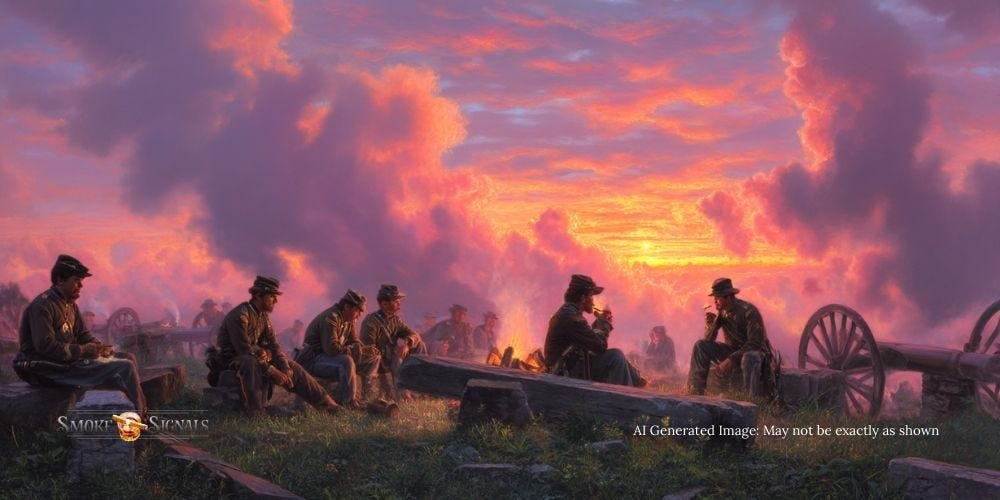
When the guns fell silent and the wounded were carried from the field, soldiers often marked survival in the simplest of ways. A match struck, a cigar lit, and for a brief moment, the battlefield gave way to quiet reflection. Smoke drifted over camps not just as habit, but as ritual — a way of pausing to honour life when death had passed so close.
Letters from both Union privates and Confederate officers describe the same small ceremony: a circle of men lighting cigars after battle, their faces tired and blackened with powder, their eyes fixed on the curling smoke as though it carried prayers upward. To draw from a cigar was to say, “I’m still here.” To pass one along was to share that gratitude with a brother-in-arms.
These moments lingered. A diary from a soldier in Virginia recalls lighting a cigar beside the graves of comrades, writing that the ember’s glow reminded him of “the campfires of heaven.” For many, the cigar became more than a luxury — it was a way of holding onto humanity in a world gone mad.
It’s a tradition that never really left. Today, when we light a cigar for a milestone — a wedding, a victory, or even just a reunion with friends — we echo that same ritual of remembrance and survival first traced in blue and grey smoke over Civil War camps.
“History isn’t always written in cannons and cavalry charges. Sometimes it lingers in the glow of a cigar — a fleeting ember, a curl of smoke, a reminder that even in chaos, men sought ritual and connection.”
Conclusion – Embers of Legacy
The Civil War was a clash of iron and ideology. Still, it was also a thousand smaller stories: of men huddled by campfires, of trades whispered across enemy lines, of one lost order wrapped around three cigars that altered the fate of a nation. Smoke hung over those years like a fragile veil — at times dividing, at times uniting, always present.
When we light a cigar today, whether to celebrate or to pause, we share in that same rhythm. A ritual born in the camps of blue and grey still lingers in the curl of smoke above us. And if you listen closely, you might hear the faint echoes of soldiers who, long ago, found solace in the same simple act.



